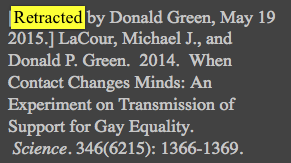Two recent studies have captured the attention of the media and considerable publicity: Alice Goffman’s book On the Run and Michael LaCour’s now retracted Science article. In both cases, the researchers’ work garnered substantial attention in the popular media, and while each also has important possibilities for social change the primary focus has been on how the research was done, including the ethicality of the researchers.
 Goffman’s work is unusual in academe, research that has so captured the public attention that it has led to a TED talk, a speaking tour, possible TV and movie deals, and a trade paperback reprint. Stunning success for any assistant professor. The University of Chicago Press has had a hand in the promotion of the book, marketing it as one would a trade book including an NPR interview.
Goffman’s work is unusual in academe, research that has so captured the public attention that it has led to a TED talk, a speaking tour, possible TV and movie deals, and a trade paperback reprint. Stunning success for any assistant professor. The University of Chicago Press has had a hand in the promotion of the book, marketing it as one would a trade book including an NPR interview.
Her work has won accolades within academe as well ~ Goffman won the American Sociological Association dissertation award for her work, which is described as a major contribution to the study of U.S. poverty and racial inequality. It has also been favorably reviewed within the discipline ~ here, for example. This is a potentially important study in the wake of recent police violence against Black Americans that especially captured media attention when a white cop killed Michael Brown, a young black man in Ferguson, MO.

LaCour’s study also won the attention of the popular media because of the incredible claim that people’s views about same sex marriage could be changed through a short conversation with someone who supported the position. Ground breaking findings in political science! This study appeared in a peer reviewed highly regarded journal, one that is directed to a very broad audience of scientists rather than a specific discipline.
The reasons for retracting the paper are as follows: (i) Survey incentives were misrepresented. To encourage participation in the survey, respondents were claimed to have been given cash payments to enroll, to refer family and friends, and to complete multiple surveys. In correspondence received from Michael J. LaCour‘s attorney, he confirmed that no such payments were made. (ii) The statement on sponsorship was false. In the Report, LaCour acknowledged funding from the Williams Institute, the Ford Foundation, and the Evelyn and Walter Haas Jr. Fund. Per correspondence from LaCour‘s attorney, this statement was not true. (ii) The statement on sponsorship was false. In the Report,LaCour acknowledged funding from the Williams Institute, the Ford Foundation, and the Evelyn and Walter Haas Jr. Fund. Per correspondence from LaCour‘s attorney, this statement was not true.
Retraction Watch has chronicled the events around the retraction and responses of the two authors.
Research Issues
It is a good thing when research findings become part of the public discourse about important issues… that is a critical role for researchers and research in contemporary society. With that publicity (whether fostered by a publisher or a researcher) comes a level of scrutiny perhaps with a spoonful of envy from other researchers. In both these cases, it was other researchers who are calling Goffman and LaCour out.
So what might we learn from these two cases. Here are some initial thoughts.
The Data Record ~ Goffman destroyed her data claiming she needed to protect her research participants and LaCour destroyed his claiming that was standard protocol. Neither position is tenable nor standard practice. While protecting research participants is of critical importance (and too often researchers blithely make a promise they may not be able to keep) but Goffman should be prepared to stand behind her promise and retain her data. And, it would seem now that LaCour may never have had data to destroy, he just said he destroyed it.
Triangulation ~ Goffman was either naive or is depending on the naiveté of her readers. Many of the critiques are reasonable requests for either corroboration, explanation or clarification. One example is her claim that, “The officers told me they had come to the hospital with a shooting victim who was in custody, and as was their custom, they ran the names of the men on the visitors’ list” has been challenged on many levels, including the unlikelihood that hospitals would release this information and that no one (and several researchers have tried) has been able to find hospitals, police departments or officers who actually do this. There are several other examples of this sort.
The onus on any researcher is to ask how to provide the best explanation of their data and this requires looking at those data in different ways, often collecting more data to clarify and test veracity.
Ethics ~ There are two contexts for thinking about research ethics: the ethics of the research practice and then ethics within the research practice. Destroying data isn’t acceptable and the ethics of research practice dictate how and for how long data ought to be kept, how to best maintain confidentiality and anonymity of research participants, honesty about sponsorship, and so on. Both Goffman and LaCour made major mistakes, and one can safely assume they acted purposefully and wrongly. In other words, there is no reason to believe they didn’t know better. LaCour’s fabrications are most egregious and his response has served only to confirm his unethical research practice.
But there is also the ethics within research practice, a much murkier gray area. Researchers, especially those doing the kind of fieldwork Goffman conducted, will necessarily encounter ethical dilemmas that arise as a result of being in the field. Her decision to live in the community she studied, and to live with some of her research participants isn’t a wrong choice (for all the critics that claim this is so, they would deny years of ethnographic research??) but it does inevitably challenge the researcher to make difficult choices. Likewise the criticism that she was not like the research participants (young black men) is an old irrelevant criticism ~ as Brian Fay has argued, “you don’t have to be one to know one.”
A number of critiques of Goffman’s work center on the ethics within research practice and are good fodder for discussions about how to do research well, in ways that respect research participants, and that leave room for researchers to explore areas of social life that may involve the illegal, immoral and unconventional fabric of human existence. These discussions are healthy for research, and the issues raised reinforce the importance of educating novice researchers about ethics beyond the ethics of research practice dictated by institutional conventions, like research review boards.
 Follow
Follow
